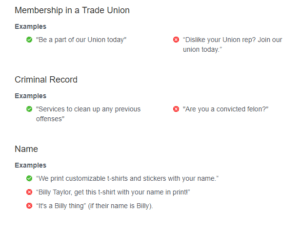The dreaded rejection notification appears in your Facebook Ad Manager inbox. The Facebook ad review team did not approve your latest ad for “not following Facebook’s Advertising Policies.” Now what?
Don’t stress! Many businesses are turning to social media to advertise and promote services and products and if yours is one of them, you most likely have come across a denial notice at some point. But we’re here to walk you through the process, help you understand Facebook’s policies, and get your ad approved and on users’ timelines in no time!
The first step you’re going to want to take when seeing the disapproval message is figuring out why your ad was denied and how you can edit it correctly so that it is compliant. During the review process, the ad’s images, text, targeting, and positioning are reviewed, as well as the content on the landing page.
Some common reasons Facebook denies advertisements include:
- It contains prohibited content or restricted content
- It doesn’t follow community standards
- The video ad contains disruptive content or entertainment restrictions
- Targeting and positioning discriminate, aren’t relevant or accurate
- Lead Ads request personal information
Prohibited and Restricted Content
Facebook is committed to providing a safe platform for users, which is why there is a strict list of prohibited and restricted content for advertisements. While some restrictions are more obvious than others, such as illegal products or services, adult content, and profanity, others can be more difficult to anticipate including weight loss plans, surveillance equipment, and personal health or “before-and-after” pictures.
Another common reason for advertisements getting declined is due to the content including or implying personal attributes. The advertisement can not include “direct or indirect assertions or implications about a person’s race, ethnic origin, religion, beliefs, age, sexual orientation or practices, gender identity, disability, medical condition (including physical or mental health), financial status, membership in a trade union, criminal record, or name.”
Avoid using the word “you” in the copy of your ads as that can imply that you know information about the user and make them feel uncomfortable about their privacy on the site.

When drafting an advertisement it is important to note that Facebook prohibits or restricts content regarding:
- Illegal products or services
- Discriminatory practices
- Adult content
- Grammar and Profanity
- Unsafe supplements and weight loss plans
- Unacceptable business practices
- Grammar and Profanity
- Weapons, Ammunition, or Explosives
- Misinformation
- Surveillance Equipment
Facebook sets clear guidelines on what is prohibited and restricted content. You can view the complete list here.
Community Standards
Facebook set Community Standards as a way of creating a safe platform for expression and being heard. The community guidelines depict what is and is not allowed on the site. The main focuses include Authenticity, Safety, Privacy, and Dignity.
“We recognize how important it is for Facebook to be a place where people feel empowered to communicate, and we take seriously our role in keeping abuse off our service.“ – Facebook
If the brand recognizes abuse or violation of the standards, depending on the severity of the case, it could mean a warning, restriction to the site, or even a tip to law enforcement.
Video Ads
Video ads undergo the same review process and must comply with the same community standards and advertising policies, as well as additional requirements. The video cannot contain “disruptive content” including flashing screens.
The video advertisements for movie trailers, TV shows, video game trailers, and similar content must not include drug or alcohol use, adult content, profanity, or violence and gore, unless prior written permission from Facebook was given. If the video ad is intended for mature audiences, it must be targeted to users 18+.
Targeting and Positioning
When selecting an audience to target your ad, it’s important to follow Facebook’s targeting and positioning policies. Targeting can not “discriminate against, harass, provoke, or disparage users or to engage in predatory advertising practices.”
All ad components, including text, images, links, and landing pages, must be relevant and appropriate. The ad can not provide misinformation or mislead users.

Lead Ads
Lead Ads that request private information including account numbers or financial information, criminal history, health information, political affiliation, sexual orientation, race/ethnicity, religion, among others, are not tolerated by Facebook.
Strunk Media Group’s Social Media Team is Ready To Guide You Through the Process
While our overview of Facebook’s Ad Policies will help you understand Facebook’s review process and advertising policy guidelines, allow you to recognize the problem and edit your post accordingly, and avoid getting a disapproved notifications in the future, you should visit Facebook’s guide to view the full list of rules.
If you believe your ad follows Facebook’s advertising policies and was mistakenly disapproved, you can appeal the denial using this form.
If you’re new to advertising on social media or you’re looking for a digital marketing agency to help your business reach its full potential, schedule a free consultation today with Strunk Media Group today.







